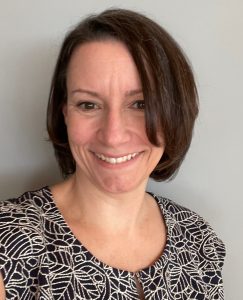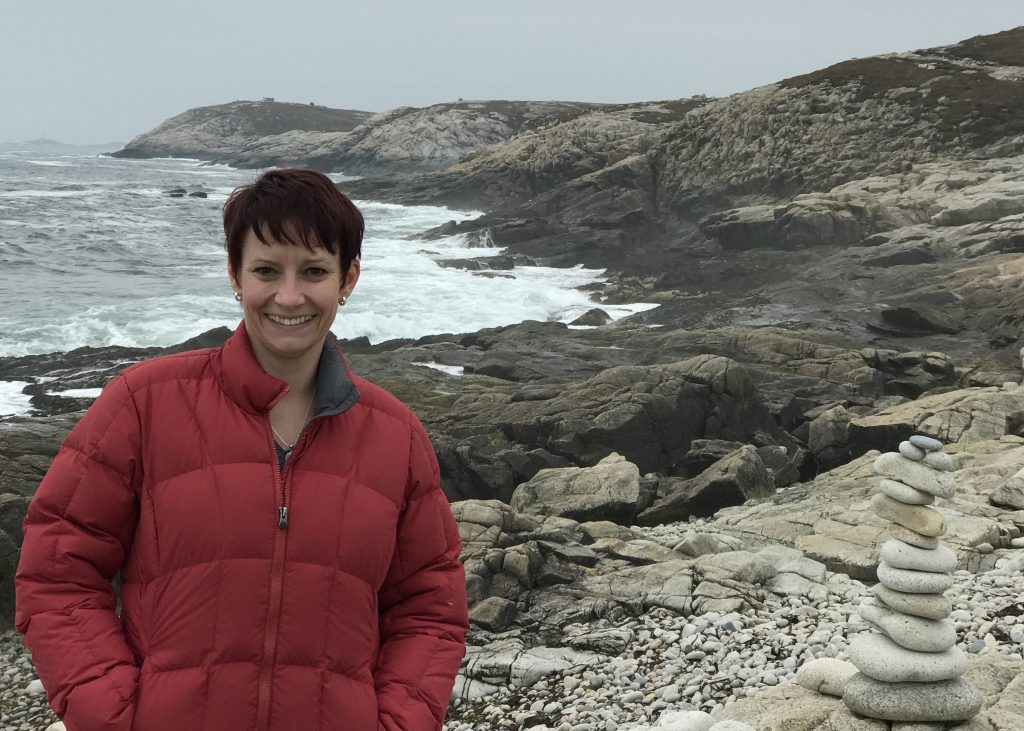Dr. Lisa Milke is a Marine Sciences alumna who received her Master’s in Oceanography from UConn in 2001 and her PhD in Biology from Dalhousie University in Canada in 2006. This interview was carried out by Patricia Myer, a current graduate student, on April 20th, 2021. We discussed her current job at NOAA, her path there from UConn, and advice for current graduate students.
Patricia: What is your current position?
Lisa: I am Chief of the Aquaculture Systems and Ecology Branch at the NOAA Milford lab in Connecticut.
Q: What does the typical day look like at your job?
Lisa: I think there’s no such thing as the typical day. Things are cyclical; you have seasonal activities that come and go. And at this point, I spend a lot more time leading a group of scientists than doing my own research. I consider myself the bureaucracy facilitator and problem solver for the group so that they can focus on the science. So, for me it depends what deadline or problem arises on any particular day.
Q: Could you expand a bit on how your work differs during Covid and before, and what kind of work you do at the Milford Lab?
Lisa: The Milford lab was started in 1931, and we focus on aquaculture research, shellfish research and the interactions between aquaculture and the environment.
Usually, this time of year we have experiments running, people out in the field, and the hatchery up and running. We would be doing research on effects of ocean acidification on different shellfish species. We would have oyster cages in the water, using cameras to identify at fish assemblages and how the cages can create habitat. There’s also ongoing work developing and testing probiotics for oysters in commercial hatcheries. This is just a bit of the work we usually do. There’s usually a wide variety going on research-wise.
During Covid, some research has continued, but in a very restricted way. Staff are only allowed to be in the facility if you’re deemed ‘essential’. There are protocols in place to make sure that two people aren’t in the same room at the same time and activities are being conducted safely. So, while we’ve been getting some lab work done, there is also a lot of writing being done by folks at home. I personally haven’t been to the lab in over a year.
Much of what I do, which doesn’t change whether I’m home or in the lab, is getting people what they need to get their work done. This could be managing budgets, trying to get approval for someone to be in the lab, finding money to get our research vessel repaired, putting a signature on some form, reviewing proposals and manuscripts or making connections among different groups inside and outside NOAA.
Q: What path did you take to get from UConn to your current position at NOAA?
Lisa: I did my masters with Evan Ward on, of course, shellfish feeding. I really enjoyed the work I was doing, but I wanted to do something a bit more applied. I tried to get a technician position when I was finishing and couldn’t find something. I knew I wanted to do my PhD anyway, so I ended up going directly into that after graduation.
I moved to Canada, where they had a national program at the time focused on applied aquaculture research. My work focused on identifying the nutritional requirements of postlarval sea scallops in an aquaculture setting. As I was getting close to finishing, a job posted at the Milford lab for a shellfish physiologist, and it had been brought to my attention. I was like, no, no, I’m going to move to New Zealand and I’m going to do a post doc, that’s my plan. And the director of research at the National Research Council, where I was conducting my work, walked across the hall, and said, “you’re a shellfish physiologist, and there’s a job for a shellfish physiologist, so, if you don’t apply for that job you’re crazy.”
I ended up applying for it that evening and ultimately was offered the position. I moved to CT before I was done with my dissertation, and it took me about a year and a half after starting at Milford Lab to finish. NOAA was really accommodating, largely because my dissertation research was the exact type work they wanted me to be doing. There was a lot of kindness from NOAA and the university as I was wrapping up.
I spent 10 years as a research fishery biologist at the Milford lab, where I really was in the lab doing hands on work. About 6 years ago, my supervisor retired. I offered to take over the branch chief position in an acting capacity with no intent to do it forever. However, once I was doing the job I realized that I didn’t hate it and I was kind of good at it, and so I switched positions. It was a very conscious move to leave the lab work side of things. My current position is never where I aspired to be, but is a good fit.
Q: What about your graduate school experience, either Masters or PhD, would you say best helped prepare you for your career?
Lisa: I would say that there were two big pieces. One was learning very practical and broad problem solving. Some days you’re fixing plumbing, some days you’re growing algal cultures, some days you’re spawning animals, and some days you’re doing spreadsheets. Just being able to solve all those different problems and jump from thing to thing is great. I no longer feel like I’m an expert in anything since I am more removed from day-to-day research, but there is a broad portfolio of things that I’ve done that informs my ability to participate productively in lots of different activities. I think that’s true to much of marine science; there’s a lot of interdisciplinary pieces to getting work done, and that backgrounds is a plus.
The other thing that really prepared me was just, the people. I think you have a tendency to make really long-lasting relationships when you’re in grad school, and those are people that I’m still in touch with. And even people you don’t keep in contact with you are still connected to. Last week actually, I was invited to participate in a review panel by a fellow UConn Marine Sciences alum who I haven’t seen in 15 years. It’s a small community, so having those people and building those relationships is helpful.
Q: What kind of advice would you have for current grad students?
Lisa: First, is to remember to breathe. Grad school is really hard. I think it’s this really weird time where you, in some ways, have a lot of freedom in your time and how you structure your day. But otherwise, you have a lot riding on something that you don’t have complete control over. A lot of different people are influencing your journey. I think that this dynamic can be really hard, and research is hard, and classes are hard. I think it’s okay to feel overwhelmed. To breathe and just move forward I think is a big piece of advice. I probably didn’t do that enough.
I would also say, do what feels right to you. I never had a career path or an end goal in mind, but I’ve always done what felt like the right thing to me. It might not have been what my advisor thought I should do, or my parents thought I should do, or a fellow grad student thought I should do, but I’ve been true to myself and I think that has worked out really well.
And the other thing is kind of getting back to that people part of it. It’s such a small community. So, spend time getting to know people as people, because those relationships can be really helpful in starting your career, really helpful in continuing your career, and it’s just really lovely to have people to rely on when you come against bumps in the road.
